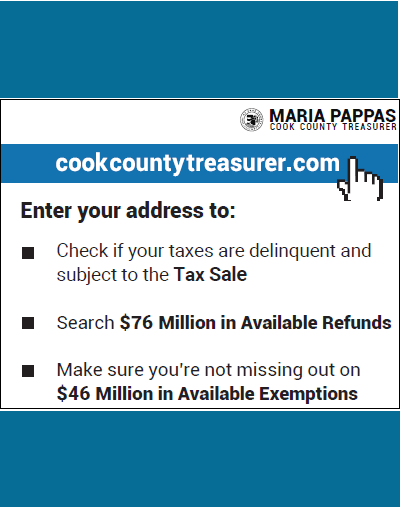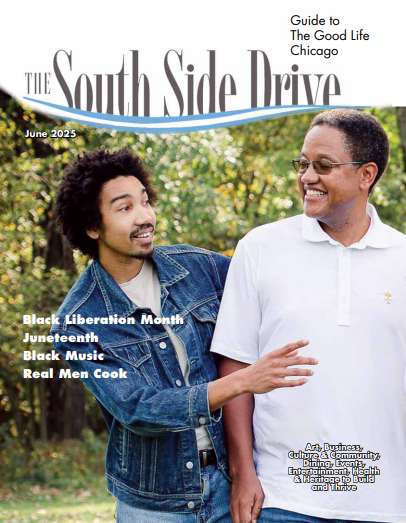Black Houses Matter: Treasurer Maria Pappas' Mission to Save Your Property
By Emma Young
Sometimes we question which politicians and government officials are on our side, and which ones are just in it for the money. Well, there is one woman in Cook County government who is unquestionably on our side. To say Cook County Treasurer Maria Pappas goes above and beyond the call of duty would be a gross understatement. Maria Pappas really and truly cares about Cook County homeowners, and she shows it in so many wonderful ways.
This article that you’re reading right now, for instance, was written at the suggestion of Maria Pappas’ office. She is constantly finding creative ways to reach out to Cook County homeowners to let them know that the County owes them money. Her weekly radio program on WVON serves the same purpose.
Black Houses Matter
Thousands of African Americans tune into WVON Radio daily. Once called “the Voice of the Negro” and now “the Voice of the Nation,” it’s the radio station that Black people go to for perspectives, opinions and information about what is happening in the Black community. So, in her quest to get information out to as many Cook County homeowners as possible, Cook County Treasurer Pappas hosts a 30 minute radio show at 11:30 a.m. every Monday, where she encourages homeowners to call in
Her goal is to reach a large percentage of the 38,000 homeowners and commercial property owners on the Cook County Tax Sale List, 75 percent of whom are Black homeowners. Of course, there are many seniors on this list. Not surprisingly most of them don’t know they are on the tax sale list, until they get a knock on the door telling them their house has been bought. These are the people Treasurer Pappas is vigorously trying to reach.
Although her Black Houses Matter radio show is perhaps the most prominent vehicle Treasurer Pappas uses to get her message out, she has also done countless Zoom meetings with political figures, faith leaders and neighborhood organizations. She has reached out through marketing and PR efforts via radio, television and print since May, 2020.
Her infectious smile can actually be felt through the airwaves, when she informs a delinquent taxpayer that the County owes them almost as much and often more, than the amount of their delinquency.
Treasurer Pappas was recently highlighted on an NBC special in which they broadcast a typical WVON exchange between Treasurer Pappas and a WVON caller that went like this: “Hey Coreen,” said Treasurer Pappas, “you owe me $3,400 but I owe you $3,000 and (she says with a chuckle) we’ll worry about the $400 later.”
Besides responding to callers, Treasurer Pappas also takes time to reach out to specific people, who have no clue that they are owed money. On that same broadcast, viewers heard a blind homeowner tell how Treasurer Pappas reached out and advised him that he had been missing out on a disability exemption. She didn’t just tell him, she sent some of her staff members to his home, to help him fill out the paperwork.
Treasurer Pappas also wants property owners to know that the first installment of this year’s tax bill, usually due in February, is not due until May. No late payment charges or interest will be assessed between February and May 2020.
Scavenger Sale Study
Every two years, Cook County conducts a Scavenger Sale. The last Scavenger Sale was held July, 2019.
When a property has unpaid taxes for three or more years over a 20-year period, that property will be included in the Scavenger Sale. “The purpose of the Scavenger Sale,” explains Treasurer Pappas, “is not to collect delinquent taxes, but to find new owners and get the properties back on the tax rolls.”
The Scavenger Sale is open to the public, which means anyone can come to the sale and bid on a property. Per the Illinois Supreme Court, the Scavenger Sale “assumes that the other available methods of tax collection have been exhausted,” and “is designed as a last resort to extinguish tax liens and forfeitures and to attempt to restore the property to a productive status.”
Notably, the majority of properties offered at the Scavenger Sale are vacant lots, which according to the study, helps explain why they attract so few bids from private buyers. Vacant lots accounted for 60.7 percent of listings included at Scavenger Sales in 2007-2019, or 88,015 of all of the 145,030 listings.
For various reasons, all delinquent properties in a tax sale do not get sold. Many of the properties are in undesirable or dangerous neighborhoods, and sometimes the value of the property is a lot less than the amount of the delinquent taxes. The Scavenger Sale study notes that high delinquent taxes discourage owners from saving their property from the Scavenger Sale. Of 50,554 properties with known market values offered at the Scavenger Sale between 2007-2019, 21, 589 (42.7%) owed taxes that were more than half of the market value.

The study shows that a disproportionate number of properties on the Scavenger Sale list, are located in Chicago wards that have predominantly Black populations. Majority Black wards accounted for 21,533 (84%) of the 25,730 Chicago properties offered at Scavenger Sales from 2007-2019.
What Treasurer Pappas found alarming, but not surprising, is the relation between high crime areas and unsold properties. The Scavenger Sale study notes that “violent crime drives down demand for housing” in wards with the most properties offered at the 2007-2019 Scavenger Sales.” Treasurer Pappas says, “African American families are leaving Chicago because of crime. They are abandoning their properties, and no one is coming to the Scavenger Sale to purchase them.”
The Study notes that 12 of the top 13 wards with the most properties offered at the last seven Scavenger Sales lost 31,335 residents between 2010-2016. These areas are so crime-ridden and dangerous that even the Scavenger Sale prices can’t seem to entice prospective buyers or developers to purchase them.
The study notes that there is also a disproportionate number of properties on the Scavenger Sale list, that are located in Cook County suburbs with a Black population of at least 40 percent. Those 29 suburbs make up 20,366 (79%) of the 25,590 suburban properties.
Does The County Owe You?
If you are a property owner, Treasurer Pappas encourages you to phone her office at 312-443-1500 to find out if the County owes you money from overpayment, or not filing all of the exemptions you are entitled to. Many residents have been pleasantly surprised. The Treasurer has brought the number of property owners who are owed money from 60,000 to under 40,000. She is trying to reduce it to zero, or as close to zero as possible.
Be sure to tune into WVON any Monday from 11:30 to Noon. Call in to 773-591-1690.
For various reasons, all delinquent
properties in a tax sale do not
get sold. Many of the properties
are in undesirable or dangerous
neighborhoods, and sometimes the
value of the property is a lot less than
the amount of the delinquent taxes.






